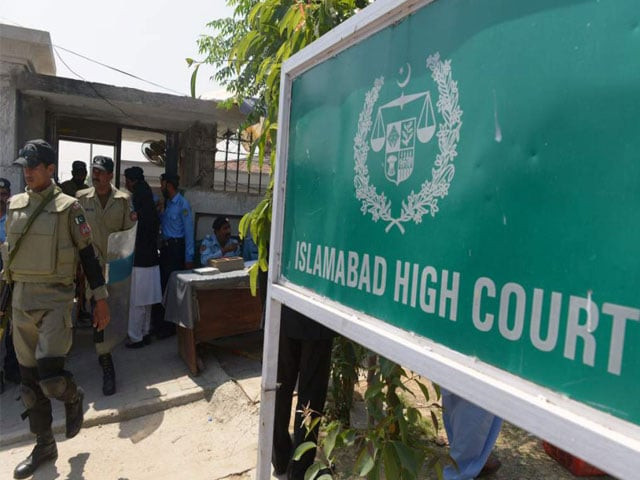ISLAMABAD:
Despite growing pressure within their own institution, a group of Islamabad High Court (IHC) judges continue to adopt an assertive and uncompromising strategy in their fight for judicial independence.
With the passage of the 27th constitutional amendment, the threat of their transfer to other high courts becomes great. However, four IHC judges – Justice Mohsin Akhtar Kayani, Justice Ejaz Ishaq Khan, Justice Saman Rafat Imtiaz and Justice Babar Sattar – remain undeterred.
In September, the five IHC judges themselves approached the Supreme Court challenging several administrative orders of CJ Dogar. They also came to the courtroom to express solidarity with Justice Jahangiri during the hearing of the petition against his suspension.
On Thursday, they challenged the 27th Amendment before the Supreme Court, which then refused to grant their request.
Following this, the judges filed a petition before the Federal Constitutional Court (FCC), requesting that their intrajudicial appeal (ICA) in the judges’ transfer case be referred and heard by the Supreme Court.
A larger FCC court, headed by Chief Justice Amin-ud-Din Khan, is expected to hear its ICA next week. The appeal seeks to overturn the Supreme Court judgment which approved the transfer of three IHC judges.
In their motion, the IHC judges raised serious and fundamental questions about the very legitimacy of the FCC.
The legal community remains divided on the judges’ current strategy. Some lawyers fear that their petition against the 27th Amendment will push the executive to accelerate its plans against them.
After this amendment, it became much easier for the government to remove them from office or transfer them to another high court.
These attorneys argue that IHC judges need to understand that they currently have no support from current judicial leadership.
Likewise, some believe that by filing a request before the FCC, judges may be seen to accept the forum’s jurisdiction.
However, lawyer Salahuddin Ahmed, who represented them in the Supreme Court, rejected this interpretation.
“The motion makes clear that they do not accept the jurisdiction of the FCC or the transfer of the case from the Supreme Court to this court,” he said. “This amounts to filing a motion for return of a complaint in a court without jurisdiction.”
Since May 2023, IHC judges have consistently raised their voices against allegations of executive interference in judicial proceedings. They first informed the then chief justice of the harassment and pressure exerted against them and their families.
On May 2, 2023, the judges also met with Qazi Faez Isa, the then Chief Justice of Pakistan. Later, in March, they wrote a letter to the Supreme Judicial Council (SJC) seeking guidance on state agencies’ interference in judicial functions.
However, their institution did not support their position. Complaints of misconduct were filed against them and social media campaigns targeting them quickly followed.
When Justice Yahya Afridi became the Chief Justice of Pakistan, many expected that the pressure and harassment they faced would end, but this did not materialize.
Subsequently, in what was widely seen as an attempt to reassert control of the High Court, the government transferred three judges from the IHC. One of them, Justice Sardar Muhammad Sarfraz Dogar, later became the Chief Justice of the IHC.
It is also true that part of the judiciary supported the government’s plan against the IHC judges, and that the transfers were ultimately approved by the court.
Justice Tariq Mehmood Jahangiri is currently facing allegations of fake diploma. He personally appeared before the Sindh High Court in the matter.
Meanwhile, an IHC bench headed by CJ Dogar, while hearing a quo warranto petition, barred him from carrying out judicial work. The case is re-set for hearing next week.
Recently, the SJC issued a notice to IHC judge Ejaz Ishaq Khan regarding a misconduct complaint. The FCC is also scheduled to hear from the ICA judges next week.
It is also worth noting that Judge Arbab Tahir has distanced himself from the group and is not a party to their litigation. Justice Jahangiri also did not challenge the 27th Amendment before the Supreme Court.
Lawyer Abdul Moiz Jaferii said the IHC judges were the first to denounce the “hybrid charade” as little more than a reckless scramble for power at all costs.
“Their struggle for independence exposed their own chief justice, his successor, and their accomplices among the Supreme Court judges and the executive,” he said.
“Judge Isa had an answer to every question except when asked why he let down those IHC judges. The best he can say is that it all happened before its time.”
Jaferii added that the former chief justice tried to cover up the situation by seeking reports from other higher courts which, through polite language and veiled references, recounted their own experiences of interference and overstepping.
“By filing a petition against the 27th Amendment, the IHC justices denounced another chief justice and another group supporting institutional excesses,” he said. “Their fight is not just for their own independence, but for the independence of the judiciary as a whole.”
Jaferii recalled the words of a former chief justice who once said, “Have pity on the nation,” only to turn that sentiment into a poem serving his own agenda.
“We can only pity this country where a judge says his parents were kidnapped and the chief justice responds: ‘Don’t worry, I talked to them, they won’t do it again.'”
He said another judge found recording devices in his room and that instead of investigating the intrusion, the state decided his decades-old diploma was fake and kidnapped a professor as he prepared to protest at the university.
“Meanwhile, the judicial hierarchy remains silent,” Jaferii said.




